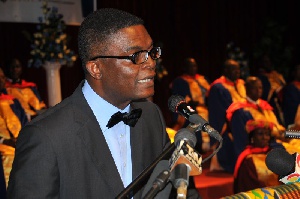Executive Director of the Institute for Democratic Governance (IDEG), Dr Emmanuel Akwetey has asserted that the Electoral Commission (EC) seems more considerate towards the two ‘big’ political parties against the multiparty system.
He also cautioned that the credibility of the 2016 general elections is masked by fear of violence which could threaten the turnout on December 7.
Dr Akwetey was speaking at the second edition of the ‘Advancement Lecture Series’ organized by the Institutional Advancement Office of the University of Cape Coast.
The theme for the edition was “Towards Credible 2016 Elections: The Role of Stakeholders in Ensuring Free, Fair, Transparent and Violence-Free Elections.”
The Ashanti Region leads a list of potential electoral violence areas provided by the EC with 14 out of the total 81 hotspots.
Over the years Ghana has continuously recorded approximately 80 percent turnout of the total registered voters at presidential and parliamentary elections informing the globe about Ghana’s maturity in democracy.
That notwithstanding, turnouts at local government elections do not hit even 50 percent. December 7 appears as a major competitive decision making for the electorate to mandate individuals and parties to run the affairs of the country in the next four years.
While some believe that construction of roads, schools, markets et al do not improve the standards of their lives; some on the other hand contend that infrastructural development is key in raising living standards.
According to Dr Akwetey, averagely 60 percent of the Ghanaian population is satisfied with their standards of living. “…and that also suggests that what we expect from our democracy after we have elected our government does not probably meet the developmental challenges that we face at the individual, household, community and national levels.”
After Ghana’s 6th general elections, the country received applauds from the world for the acceptance of the electoral results that ended up in the Supreme Court of the land.
Although Dr Akwetey believes credibility of elections has its own challenges, he thinks political exclusivism should also be a concern. “After every election, the system somehow closes up. There is the believe that people who are not members of the ruling political party are frustrated in the democratic system because they are not given jobs.”
The Executive Director of IDEG also blamed high inflation, deficit and economic challenges that confront the nation after elections for the perception people have about abuse of incumbency. “Government we suspect spends a lot of our tax or borrows heavily.
Oppositions also spend a lot and we don’t know where their money comes from.” One worrying issue for Dr Akwetey however is about the two major political parties. And he underscored, “Recently the EC required political parties to comply with the law on financing parties…the EC said it will take action against those who failed to submit their reports.
The two big parties didn’t submit theirs yet nothing happened to them’ Dr Akwetey asserted.
Vice Chancellor of the University who was the chairman of the event cautioned the audience to ensure peace before during and after the general elections.
The lecture was moderated by a private legal practitioner Samson Lardy Anyenini
General News of Sunday, 30 October 2016
Source: 3news.com

















